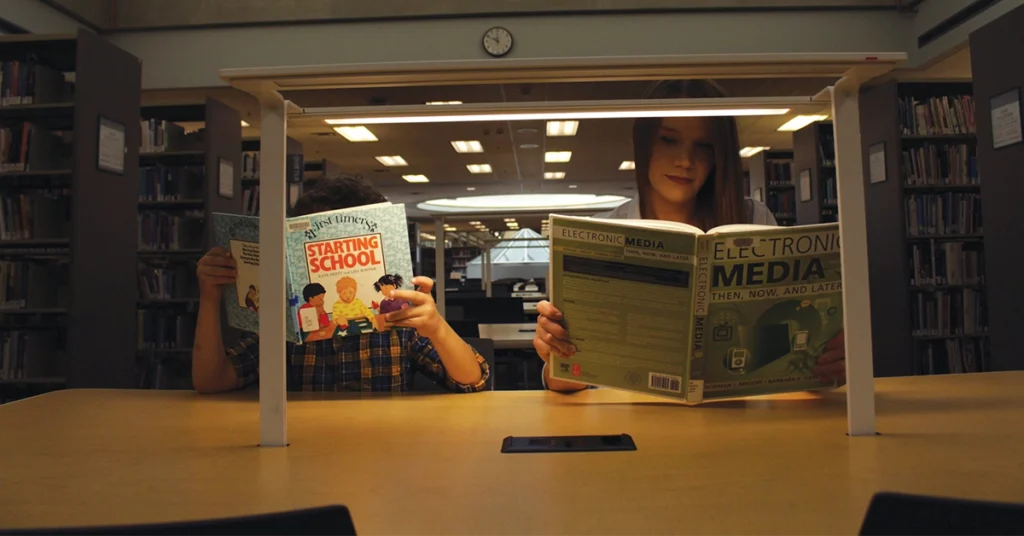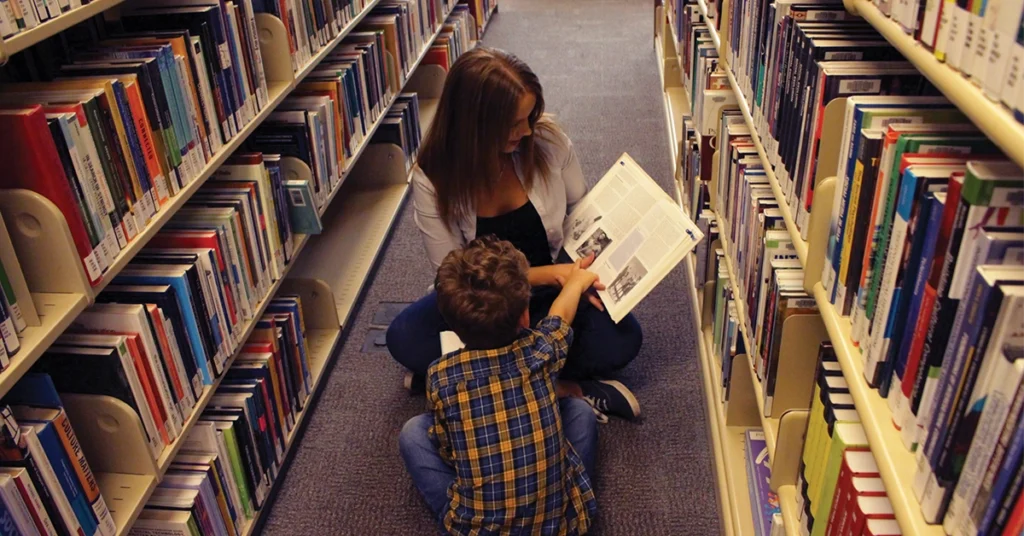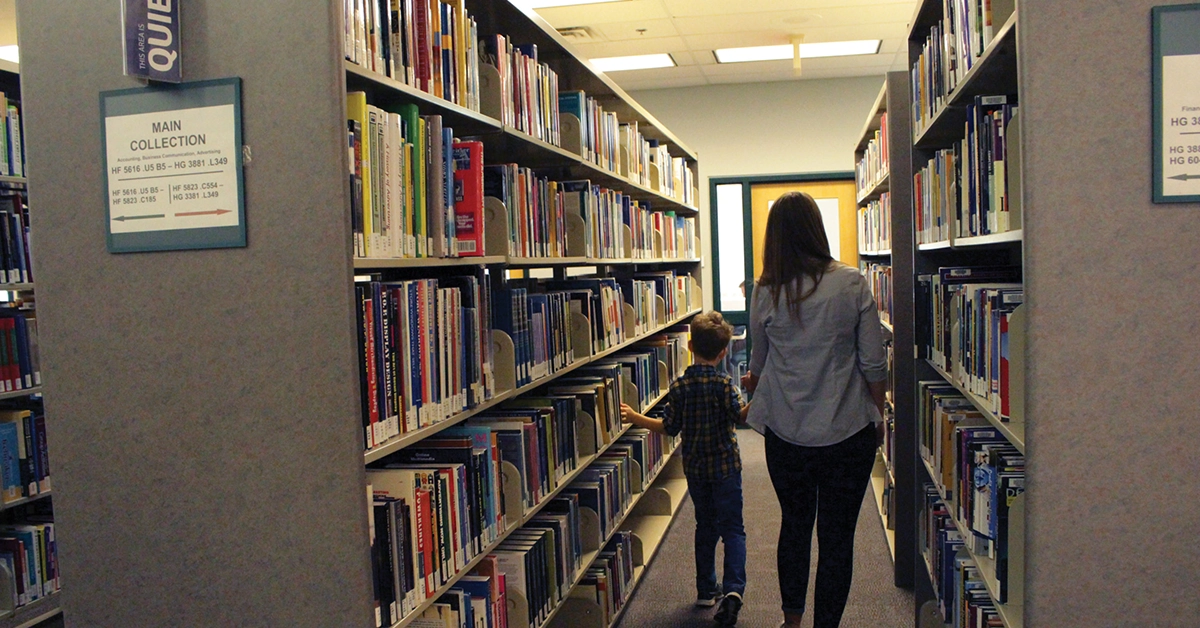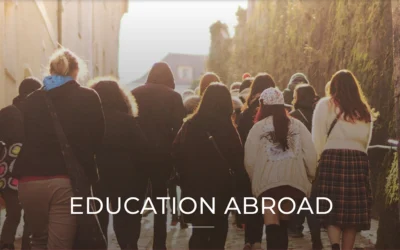University student demographics are changing, and student populations are no longer made up primarily of recent high school graduates, says Irfan Chaudhry, director of the Office of Human Rights, Diversity, and Equity. With this changing demographic comes an increased need for resources universities may not have been aware are missing from their campuses. One demographic at MacEwan University that is becoming far more recognized is students who are also parents.
“Students who also have children is a very underserved community at MacEwan, and most universities to be quite honest, just because I don’t think that group has been as vocal as they are now because those students are being impacted,” says Chaudhry.
One student who is advocating for the needs of students with children is Christine Feron, a psychology major in her final year at MacEwan, who is also a mother. Feron is working with the Office of Human Rights to promote the available resources for students who are parents, as well as indicate where needs remain.
“I really want these things to be readily available and easily accessible to students. Because a lot (of) times in the first week of school of first semester … you have no idea how to navigate these systems, so I want students to be able to access easily and be able to take advantage of the amazing resources we have on campus,” Feron says.

MacEwan is working to move in the direction of being more accessible for families to be on campus, such as the Early Learning at MacEwan (ELM) daycare becoming more affordable with the NDP’s $25-a-day daycare initiative, as well as establishing policies about the protection of minors on campus. However, there are certainly areas where the University can improve. For example, there are only four change tables in City Centre Campus — two of which are in the fitness centre, one in a women’s washroom in Building 7, and only one in an all-gender bathroom in Building 7 — and the campus daycare has a two-year waitlist.
“Even addressing things like we don’t have change tables in the men’s rooms, or we don’t have places for mothers to pump if they’re away from their child at the time, there’s no private spaces for parents to role change (from parent to student) throughout the day,” says Feron.
The support systems MacEwan does have in place are underused, Feron says, and many students have expressed not knowing about them. Rebecca Topping, a recent Bachelor of Communications graduate, says that she had no idea there were support systems available — although she did not want to spend more time on campus and away from her children than necessary.
Lorenzo Covelli, a math sciences student, says the only support he tried to access was the daycare, and he was unable to get in due to the long wait.
“I mean, the biggest thing you want to be able to provide students is success, right? And you don’t want students to have worry about the childcare aspect of things to be a hindrance on their education, so if there’s a way that you can incorporate (a) space (designated for children) within the University that the student goes to, it just helps the student success,” Chaudhry says.
Priorities change when there’s the addition of a child to a university education. When time outside of class involves caring for another person, it can be difficult to get the necessary work done.
“Before I was a father at school full time I could honestly get up and go study whenever, but now it’s a lot different. At the times I do find to study, something could still come up and I have to adjust,” Covelli says.
“Most of the main differences I saw within myself. Because I was taking precious time away from my new babies, I had to make it worth it. The ‘C’s get degrees’ mentality was replaced by a drive to get it done right the first time,” says Topping.
Choosing to pursue a post-secondary education is a large commitment, but choosing to go back to school with the added stress of being a parent is an immense undertaking. The motivations behind this decision for each parent tend to mirror each other.
“It’s been kind of an encouragement actually to finish up school and try to find something a little bit better career-wise, it would help me be a better father to my child,” Covelli says.
“I wanted to come back for two reasons: one, my mom told me that if I dropped out I would never go back, I wanted to prove her wrong; and two, I didn’t want to go back to work at some nothing job, especially now that I had a family to provide for.
“You don’t want students to have worry about the childcare aspect of things to be a hindrance on their education, so if there’s a way that you can incorporate that space within the university that the student goes to, it just helps the student success.”
— Irfan Chaudhry, director of the Office of Human Rights, Diversity, and Equity
I wanted to get a career that my kids would be proud of, that I could be proud of,” Topping says.
“School actually was the best option to … not only allow me to find a sense of happiness in my career but also to support my son above the poverty line. So it all falls back to providing a better life for my son,” says Feron.
Although Feron chose to come back to school with her son in mind, she has made it her goal to provide a better educational environment for students in similar situations to her own.
“I discovered so many resources that were available on campus nearing the end of my degree. And I was super sad about it because I probably would have accessed them so much faster … and I just thought that this (information) should be compiled in a way that other students don’t fall into this issue like I did,” says Feron.
Her objective is to organize the resources that apply to students with children, and have them listed on their own webpage. The webpage will be a separate tab on the website for the Office of Human Rights, labelled Students with Children.
“I think it fits into our overall mandate of creating welcoming and inclusive spaces at the University,” says Chaudhry. One of the ways the Office of Human Rights can help students who are also parents feel included within the university is simply by acknowledging the demographic, he says.

It’s the involvement of a student identifying needs that helps promote change. Although universities have a goal of being proactive in adapting to the diverse student demographics, there are times when the organization needs to be pointed in the right direction, Chaudhry says.
The initiative Feron is putting together also involves what will be called Parent Connect Times, a monthly meeting where parents can discuss anything regarding parenting.
The group is meant to build a sense of community amongst parents, allowing them to support one another while their children play in the other side of the meeting room. The dates and times for these events will be available on a private Facebook group called Students with Children at MacEwan. The website link for students with children will also have the Facebook group and event dates.
Although the institutional changes are positive, support from within the classroom is also something students view as necessary for their success. Professors at MacEwan were described by both Covelli and Topping as accommodating, and Topping says that professors offered to let her children come to class and were understanding when she needed to miss class to take care of a sick child.
“I discovered so many resources that were available on campus nearing the end of my degree… and I just thought that this (information) should be compiled in a way that other students don’t fall into this issue like I did.”
— Christine Feron
Individual professors can be very accomodating, but there is always room for improvement. There are certain aspects of education that are made more difficult with the addition of being a parent.
“Group work is very, very difficult to complete when your free time on campus isn’t your own. It would be really great if instructors let students with situations like mine hand in an alternative assignment sometimes because I probably spent over $1,000 in babysitting just to get group projects done and that sucked,” says Topping.
At an institutional level, there are other changes that can be made. MacEwan is moving towards being more accessible to students with children, but there are ways to make students who are also parents feel more welcome and more involved on campus. Chaudhry describes his inspiration for an area on campus designated for families, that could build a further sense of community and trust.
“In an ideal world, I think I would like to have (a) space (that) students who are parents can access during school hours. Where they build that connection between other students who are also parents … That’s still a while away, but I’ve seen other universities have it and so it’s a matter of saying, ‘why is it that we can’t provide it here?’
And maybe those are questions we can have at broader levels, but that’s where we can at least start to encourage those conversations to happen,” Chaudhry says.
MacEwan’s additional policies and implemented programs are the first steps in addressing the student demographic changes. This initiative to bring students with children together, and make support systems more accessible, is helping to make the university’s campuses inclusive for all students — which is the goal of the Office of Human Rights, Diversity, and Equity.
Photography by Lydia Fleming.





0 Comments